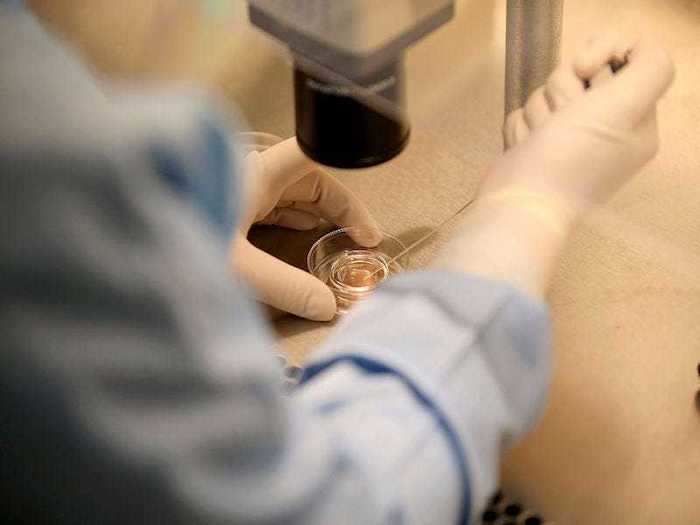If pizza upsets your stomach, there may be cause for concern.HBO
- Celiac disease affects about 1% of the population and its treatment, a gluten-free diet, is nearly mainstream.
- But there's a lot of misinformation about the condition, like that you must have symptoms to be diagnosed and that gluten-free eating is always healthier.
- Here are seven facts about the illness you may not know.
Celiac disease is a serious autoimmune disorder that can damage your small intestine if left untreated. It is triggered by a diet that includes wheat, rye, and barley products. Although some people may choose a gluten-free diet for other reasons, it is imperative for the health of celiac disease sufferers, who make up about 1% of the population.
Since the Celiac Disease Foundation recognizes over 200 separate symptoms that can indicate the disease, it can be tricky to diagnose. Still, starting treatment as soon as possible is critical in order to avoid even more serious health complications such as type 1 diabetes and multiple sclerosis.
Read on to learn more, and be sure to talk to your doctor about your concerns.
A doctor needs to perform tests to know if you have it.
Christopher Furlong/Getty
If you and your doctor have reason to suspect celiac disease, blood testing is the first step toward diagnosis. To obtain an accurate diagnosis, you'll need to continue eating your normal diet — not changing to a gluten-free one — prior to your scheduled blood draw.
If uncomfortable gastrointestinal symptoms have convinced you to change your diet already, be sure to tell your doctor. According to celiac disease charity Beyond celiac, you may be able to carefully structure a gluten challenge to increase the likelihood of accurate blood test results.
Other medical tests your doctor may order include endoscopy to check for celiac-related inflammation and damage in your small intestine, and also genetic testing.
Celiac disease is genetic, with one study showing 44% of close relatives tested positive for the disease.
Shutterstock
If a first-degree relative (parents, children, or siblings) has a known celiac diagnosis, you should talk to your doctor about testing. According to the Celiac Disease Foundation, these close relatives have a 1 in 10 chance of developing celiac disease.
A 2019 study, published in Mayo Clinic Proceedings, found that chance may be even higher. In it, researchers found that 44% of close relatives who were tested had celiac disease, though almost all had atypical symptoms or no symptoms at all.
In those cases, it may be dubbed "silent" celiac.
If you have anemia, GERD, Down syndrome, or several other illnesses, you may want to get screened for celiac.
Hollis Johnson/Business Insider
Recommendations from major celiac disease organizations say people with any of some 22 illnesses should get tested for the disease, according to Celiac.com.
Among them are anemia, GERD, Down syndrome, IBS, recurrent miscarriages, and even "short stature."
Some people have no symptoms, but that doesn't mean damage isn't being done internally if the condition is left untreated.
structuresxx/Shutterstock
Digestive symptoms are more common in children than in adults, but some people show no symptoms at all and yet have positive tests come back for celiac disease, according to the National Institute of Diabetes and Digestive and Kidney Diseases.
Digestive symptoms include (but are not limited to): chronic diarrhea, constipation, bloating, gas, stomach pain, and vomiting. Avoiding small intestine damage is important because if left untreated, your body will not be able to absorb the nutrients from your food that your body needs.
Non-digestive symptoms include anemia, bone or joint pain, depression, anxiety, fatigue, missed menstrual periods, and extreme fatigue.
If you think you may have celiac disease, take this Celiac Disease Foundation questionnaire and bring it with you to see your doctor.
The only known treatment is a dietary change.
You'll have to cut out gluten if you have it.
Justin Sullivan/Getty
Currently, the only thing that helps celiac disease sufferers is strict adherence to a gluten-free diet. Besides avoiding traditional breads and pastas, this also means that drinking most traditional beer types is out. Gluten-free beers do exist, and opinions on their quality vary even more widely than the symptoms that may indicate celiac disease.
You'll need to learn a lot about hidden sources of gluten in your diet as well, including traditionally brewed soy sauces, most blue cheese and blue cheese dressing, and even some pills and supplements.
You may not have celiac disease but still feel symptoms ease when you cut it out.
It's possible you could test negative.
SG SHOT/Shutterstock
In some cases, people may suffer from the symptoms of celiac disease yet have all tests come back negative.
Since blood testing only works if you are actively consuming gluten at the time, it's possible that some people can have celiac disease and test negative if they already stopped eating gluten for a long enough period prior to testing.
In any case, NCWS is the term used to describe people who experience celiac symptoms, see improvement when they go on a gluten-free diet, and yet have tested negative for the disease. Intestinal damage for these individuals is still a danger, according to the Celiac Disease Foundation.
It's important to be aware that other factors could explain why cutting out gluten may result in feeling better. You may be eating more fruits and vegetables where before you filled up on processed carbs, for example.
For some people at risk of eating disorders, eating gluten-free, like any restrictive eating pattern, can conceal what's really an unhealthy behavior.
Celiac disease may increase the risk of an eating disorder, and vice versa.
JGI/Jamie Grill/Getty Images
A large 2017 study out of Sweden found overlap between anorexia nervosa and celiac disease, showing one may be misdiagnosed for the other and that both conditions seem to slightly increase the risk of developing the other.
Specifically, it found people with celiac disease are four to five times more likely to have a history of anorexia, and are twice as likely to experience it again.
Celiac patients say it makes sense, Kate Johnson wrote in Allergic Living.
"It's the pain of it," Tanille Hunik-Kosolofski, who was diagnosed with celiac, anorexia, and IBS in 2013, wrote on social media. "I don't like food because of the pain it causes me."







